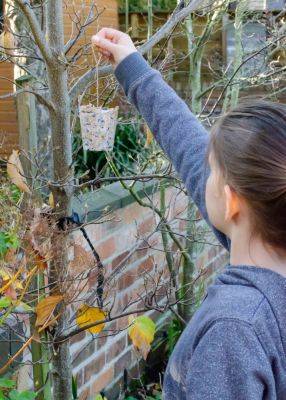These homemade bird feeders are a great way to give your local wild birds a real treat. You can make a bird feeder at any time of year, but it’s particularly important to support wild birds in winter.
Winter Ideas, Tips & Guides

How to embrace winter charm in your home
Collaborative post
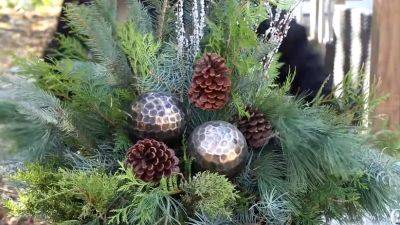
DIY Porch Pots with Spruce Tips & Evergreens
DIY Porch Pots with Spruce Tips & Evergreens Watch and learn how to use spruce tips, pine branches and more evergreens to make gorgeous winter porch pots! Plant porch pots with spruce tips and evergreens for winter interest
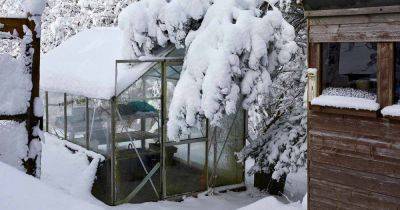
35 of the Best Crops for Your Winter Greenhouse
35 of the Best Crops for Your Winter Greenhouse

200 funny winter jokes for kids and winter puns
Brace yourselves for a flurry of laughter and an avalanche of humour as we dive headfirst into these cool winter jokes for kids!
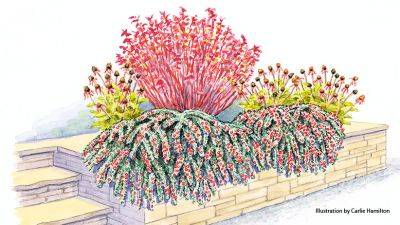
Multiseason Garden Bed with Hesse Cotoneaster
Multiseason Garden Bed with Hesse Cotoneaster Get fall garden interest that lasts into winter with this easy-care plant combination featuring a Hesse cotoneaster shrub. Fall into winter with multiseason plants
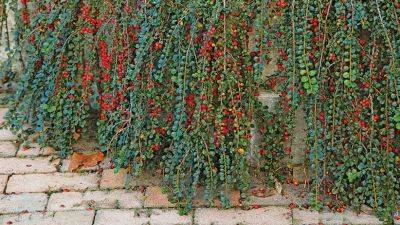
Hesse Cotoneaster
Hesse Cotoneaster Get berries for fall and winter interest when you add Hesse cotoneaster shrubs to your garden. Enjoy year-round interest with Hesse cotoneaster
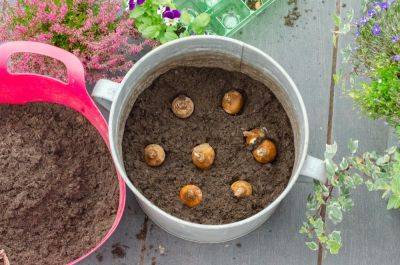
How to plant a bulb lasagne: easy guide to layering bulbs
If you’ve never heard of a bulb lasagne you’re probably raising your eyebrows right now. It is a real gardening ‘thing’ though!
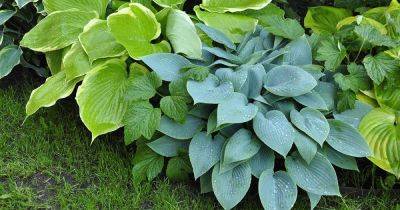
How to Overwinter Hosta Plants
How to Overwinter Hosta Plants
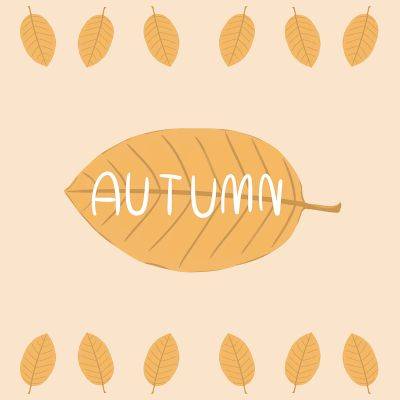
How to protect fruit trees from frost
When I woke up yesterday morning, it was misty. We’re approaching the middle of October, which is the usual time for the first frosts of autumn in my part of the UK. People in different areas are already reporting the arrival of the frosts on Twitter. This means it’s time for me to pop out into the garden and bring in my lemon tree (which I grew from a pip, several years ago). It has been enjoying the summer weather in the garden, but it’s only really hardy down to -10°C. I’ve nearly lost it a couple of times, and it has died right back to nothing, but somehow it always manages to come back.

Overwintering alliums 2016: garlic and onions
When I clear the next bed it will be time to plant the overwintering onions. I choose to plant my onions in the autumn for two reasons; the first is that I like having the beds filled overwinter. It’s nicer than having a bare garden to look at. The second is that they are harvestable about a month earlier in the summer, which means their bed is available for replanting a month earlier, and that works for me.

How to protect your plants from pernicious wind effects
When I was younger (so much younger than today), I learned how to ride a motorcycle. Whilst discussing the effects of weather on road conditions, my instructor said, “the most dangerous effect comes from a type of weather you can’t see. What is it?”
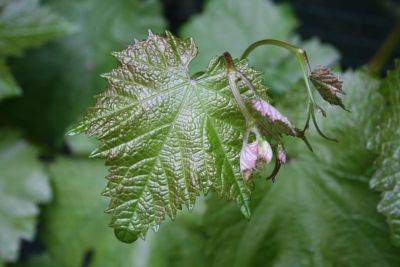
How to get the kitchen garden ready for winter
A couple of weeks ago my mother asked me if I was putting the garden to bed for the winter. It’s a common gardening phrase, and yet I have very little understanding of what it means. It implies the garden is going to be hibernating all winter, which isn’t true for a well-designed ornamental garden, and certainly isn’t true for a kitchen garden. Perhaps it means the gardener is going to be hibernating all winter, and the garden needs to be prepared for a long, untended stint? It can’t be about getting the kitchen garden ready for winter, I have been doing that all year.

Foraging and adventure in Jersey
Can you imagine stepping outside your house and wading out onto a reef to collect seaweeds and shellfish for your lunch? Or talking the dog for a walk into the nearby forest, hunting for mushrooms and foraging edible plants to go with them?

Before the Frost
These are the tea bags I buried in the garden in July for the Tea Bag Index, a citizen science project investigating soil health. I dug them up a couple of weeks ago, and they have been drying on the dining room table. There are accompanying soil samples to go with each tea bag. It’s time to send them all off to Tea Bag Index HQ, so they can become part of the national and international data set. It will be interesting to see the results in due course.

10 winter vegetables to grow now
It’s time to cut down on your carbon footprint and help lock carbon in the soil, and the good news is that this doesn’t have to be a self-sacrificing activity, it can be a win-win situation if you choose to grow your own food!

7 days, 7 harvests: no. 3
Last year a friend gave me some seeds of Claytonia (Claytonia perfoliata), which has a variety of common names, inclyding miner’s lettuce and winter purslane. It grew well and I encouraged it to self-seed.

125 ice puns and ice jokes to bring tears to your ice
Get ready to experience a frosty blast of family-friendly fun to warm up even the chilliest winter day! This list of ice puns and ice-cold jokes are sure to thaw out those serious faces and bring on the giggles.
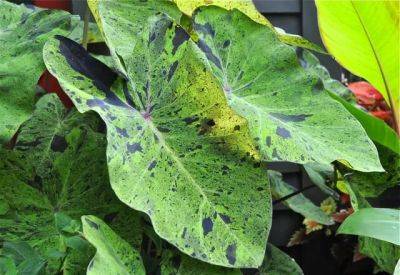
Colocasia ‘mojito:’ keeping our love alive in winter
Colocasia ‘Mojito’ (Zone 7b-10), like all its cousins that we call elephant ears or taro, is a heat-loving plant that’s also hungry and thirsty. I grew it in a bright spot in a potting soil with lots of compost, and stood a big, deep saucer underneath—something I wouldn’t do with most other plants outdoors for fear of rotting them off. I don’t use chemical fertilizers, but I mixed in some all-natural organic formulation at planting time and occasionally added fish and seaweed emulsion to the water I gave it.In food production, prevalent in Asia, the Pacific and the Caribbean, it’s the starchy tubers that are the thing—bigger is better. In ornamental horticulture, the above-ground portion is where it’s at, and here’s where the tricky part comes in about overwintering some of the most spectacular new taros—including ‘Mojito,’ and the better known ‘Black Magic.’ They don’t produce big tubers that can be lifted, like you might a canna or some of the elephant ears, and stashed dry in the cellar.
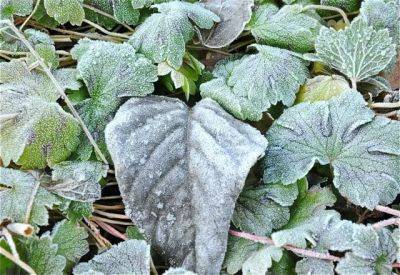
Help me make winter plans, win ‘a way to garden’
EVERY YEAR AROUND THIS TIME I ask the same question: What shall we do this winter—during gardening’s supposed offseason? A hoarfrost on the perennials and grass the other morning (above) reminded me that you-know-what will close in sometime soon, so what do you think? In return for your planning help, I’m offering a chance to win a signed copy of my collectible first book, “A Way to Garden.”

Doodle by andre: a winter best forgotten
AS ANDRE SO CORRECTLY AND MODESTLY pointed out to me, nobody draws birds with the precision he does. Watch out, David Sibley, our dear Andre Jordan is nipping (chirping?) at your heels.
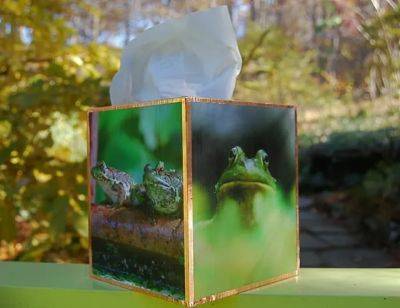
Where the (frog)boys are for winter
The less scientific part first: When I picked up my mail Friday, there was a box from Shandell’s, a store not far from me whose owner, Susan Schneider, makes astonishing lampshades out of vintage wallpaper and handmade papers and fabrics…or at least that’s her primary business. I was expecting a lampshade I’d ordered not long ago, but unless she’d dehydrated it, no way my big shade was in that little Priority Mail box.Susan’s business motto is: “Things that make you smile,” and she could not be more correct. Imagine how big my smile was when out of the mystery box came her surprise, no-special-occasion gift: my own custom tissue-box cover, made from decoupaged, downloaded images of my dollface frogboys from A Way to Garden, where Susan is a regular visitor. You can have a memo
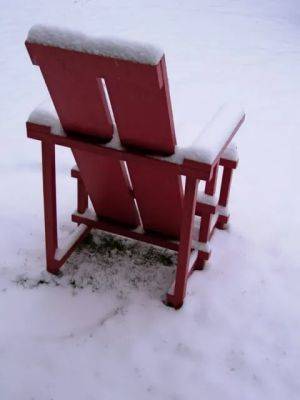
Slideshow: a garden walk in winter
BEFORE IT’S TECHNICALLY GONE, a look at winter in the garden, in words and pictures.
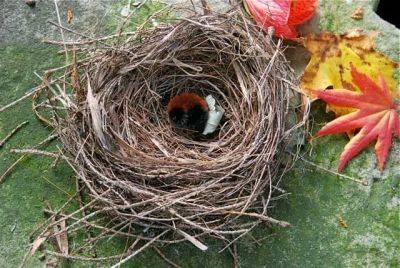
My annual question: what are your winter plans?
As I said in my November 8, 2010 post, the A Way to Garden philosophy (developed through a very unscientific 25-plus years of digging holes) is that the garden is a 365-day companion, and that the season never ends.You can hear me talk about that notion in today’s podcast with my friends at Robin Hood Radio, by the way. Or in the “woo-woo video,” as I call it, that I made this past spring. It’s right here (though you have probably seen it):WITH THAT ‘WE NEVER CLOSE’ attitude, I will continue posting and also sending newsletters* in the hopes that all gardeners have plants on their minds no matter what the weather delivers—and speaking

Up to our necks, but more winter to come
THE BUDDHA BUDDIES AND I REMAIN up to our necks in wintry mess, with more to come.
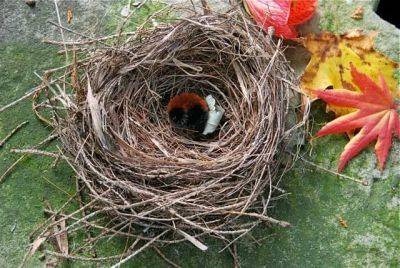
A note of thanks, news, and my winter plans
The philosophy of A Way to Garden–and my philosophy in 25-plus years of digging holes–is that the garden is a 365-day companion, and that the season never really ends. With that in mind I will continue posting (though, like last winter, on a slightly lighter schedule than in April through October) and also sending newsletters in the hopes that you, too, like to keep talking and thinking plants no matter what the weather has in store. (Register to receive them by clicking here.)I have been stockpiling photos of hot perennials and woody things we haven’t covered yet; taking notes on such topics as which varieties of chard and kale were best of the several I grew; prepping more FAQ pages on key how-to topics; researching how those of us in the East can fend off a repeat of tomato troubles next year, if that’s possible. And more–more of the usual stuff and unusual stuff I plan to keep producing even if it snows from tomorrow until Easter. (Bite my tong

From the forum: domestic flaps, winter shrubs
Member Eblacroix asked the best gardening question ever: “Anyone have tips on how to deal with spouses who might not be as excited to start 50 gardening projects at one time like I do?”Uh-oh. Got any advice to share?Member Joyhockman wanted advice for shrubs that would be showy in winter in her shady garden, and beauties from Mahonia to Skimmia and many more have been offered up so far. What are your best recommendations to add to the growing list?Remember: You don’t need to register to use the Forum, unless you want to ask or answer a question. You can always browse and search for answers, even anonymous
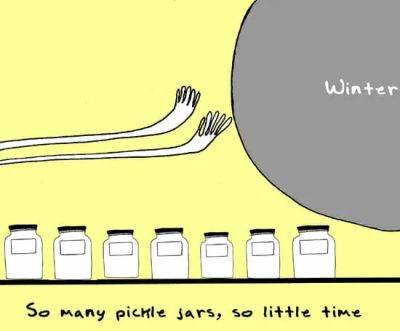
Doodle by andre: keeping winter at bay
I’M PRETTY SURE I CAN pack enough summer into jars to get me through the dark days, or at least I’m trying. What’s your tactic for pretending the days aren’t getting shorter fast? (Thanks to dear Andre Jordan for his wealth of garden doodles.)
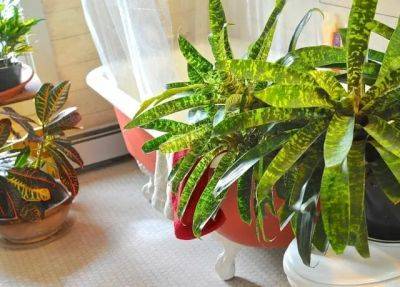
Houseplant tuneup: winter care regimen
As days very gradually grow longer from mid- or late January on, the houseplants signal it little by little, with hints of new growth or at least perkiness. By March sometime, they tell me that they are really awake, and I need to pay even stricter attention, adding a proper meal to the winter tuneup regimen of shower-and-shave. I resume fertilizing March onward, but skip November through February, while there just isn’t enough light to support active growth.Most of my charges get groomed and have a quick shower about monthly from December to April, in my Victorian clawfoot tub. I put a bit of screen over the drain to catch particles from washing down.To rehydrate and/or lightly feed, I use a plastic dishpan. I fill it part of the way with water and seaweed-fish emulsion concentrate diluted to label directions. Each plant stands in there to
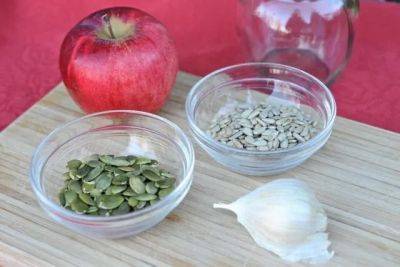
Winter salad with apple, pepitas, sunflower seeds
How much dressing-to-greens you like is up to you. Make a cupful and use it through the week, or simply whisk small amounts of the basic ingredients to taste in the bottom of a large-enough-for-tossing bowl, and whisk before adding greens and the rest.for 1 cup of dressinglarge clove of raw garlic, grated (2 teaspoons of grated shallot can be substituted) 1 teaspoon grainy Dijon mustard, or to taste ¼ cup vinegar, a combination of red wine vinegar and balsamic ¾ cup extra virgin olive oil salt and pepper to taste for the saladraw pumpkin seeds raw sunflower seeds crisp, not-too-sweet apple, sliced mixed greens stepsIn a jar or bowl, combine the dressi

Doodle by andre: a worm’s eye view of winter
AMEN. Let’s hear a chorus of it: AMEN! (Thanks, Andre Jordan, for another of your delightful doodles.) A lot of “inside contemplating” going on over here.Tagsandre jordan
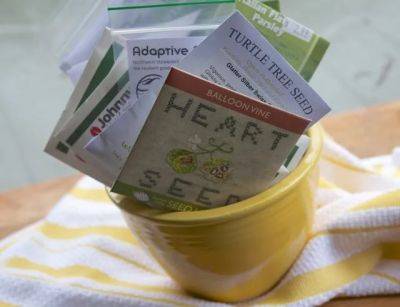
My binge of a 2014 seed order: the brutal winter made me do it
The snow that covered 99 percent of my place three days ago is now holding on to only 15 percent, thanks to a few warmer days and a crazy deluge. But the ground remains locked up tight, an inch of deceptive muck covering rock-solid frost.For now the kale and Brussels sit on the kitchen counter, atop a heat mat and beneath a plastic dome. When those sprout, broccolis and parsley will go in my improv countertop germination chamber, and that first generation will move to a spot under lights.My tradition about now each year on the website is to post my seed order, but this time I’m embarrassed at wh

Ideas for a fall and winter of soups, with ‘bread toast crumbs’ author ali stafford
Besides ideas for flavor combinations, we’ve assembled loads of links to specific recipes for soups ranging from winter squash to lentil, onion to tomato, root vegetables and even garlic, here and on her website. Read along as you listen to the Oct. 30, 2017 edition of my public-radio show and podcast using the player below. You can subscribe to all future editions on iTunes or Stitcher (and browse my archive of podcasts here).Plus: enter to win Ali’s book “Bread Toast Crumbs,” which includes ideas for great easy peasant loaves, soup toppers and even some soup recipes, by commenting at the very bottom of the page.Update: Ali and I also did a whole other vegetable soup episode–from the basic version to recipes with beans, and even mushroom soups, too. It’s here.soup ideas with ali staffordQ. I’ve been so looking forward to this conversation about my favorite food.A. I’m so happy it’s soup se

On radio and podcast: calendula, and winter birds
Dennis’s recent blog post about pine siskins (top photo) in recent abundance–a favorite species here in my garden some lucky winters-of-plenty, too–detailed the relationship the birds have with red alder trees (Alnus rubra), and how their beaks are perfectly formed to fit into the tight spaces in the alder’s conelike structures and get at the little seeds.(I love such evidence of co-evoilutionary strategies between birds and plants.)Also appearing in greater-than-“normal” numbers this year, at least in the Pacific Northwest: snowy owls. “Voles. look out,” says Dennis (whom I told I have voles to spare should they run short out West; happy to dispatch a truckload from my garden anytime).my calendula feverI’M GROWING CALENDULA again, I reported recently on the blog, and to start off the latest radio show, I
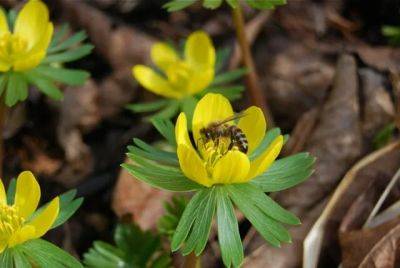
Hot p(l)ants: winter aconite, eranthis hyemalis
In late winter or early spring phrases like “slow to establish” are heard from frustrated gardeners seeing maybe 2 of the 200 they planted last fall actually doing anything.Years ago I recall reading upstate New Yorker Kathy Purdy’s frustration on her Cold Climate Gardening blog, and how she’d since learned about soil pH and its effect on winter aconites, as Eranthis are commonly called. In a vintage how-to column in “The Telegraph,”
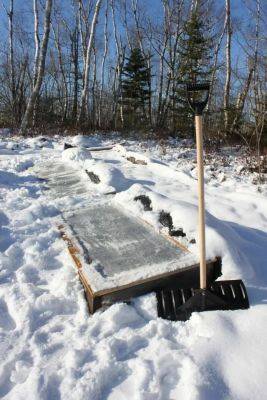
Productive fall and winter vegetable gardens, with niki jabbour
I guess that’s why she titled her 2011 book, “The Year-Round Vegetable Gardener: How to Grow Your Own Food 365 Days a Year No Matter Where You Live.”Niki’s vegetable garden in Halifax just got a facelift to become even more productive. She is one of the contributors to the blog Savvy Gardening and creator of the award-winning radio program, The Weekend Gardener, that’s heard throughout Eastern Canada. And we spoke just in time for all of us us to order the seeds and learn the tactics we’ll need to grow our own offseason gardens, too.Read along as you listen to the Aug. 8, 2
Popular Topics
Our site greengrove.cc offers you to spend great time reading Winter latest Tips & Guides. Enjoy scrolling Winter Tips & Guides to learn more. Stay tuned following daily updates of Winter hacks and apply them in your real life. Be sure, you won’t regret entering the site once, because here you will find a lot of useful Winter stuff that will help you a lot in your daily life! Check it out yourself!
